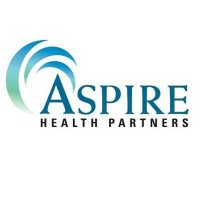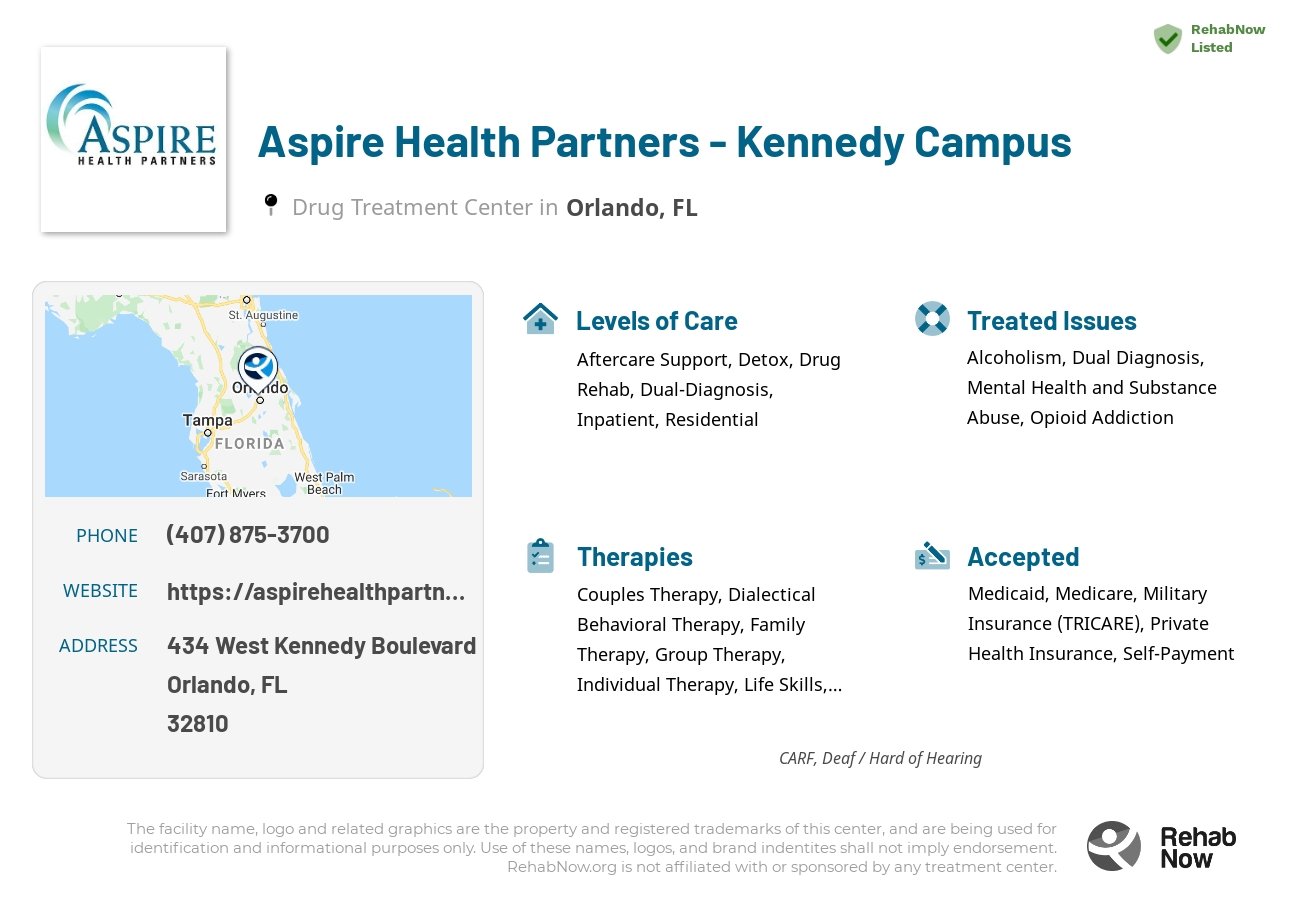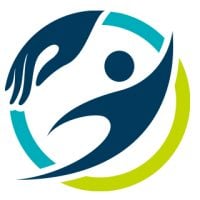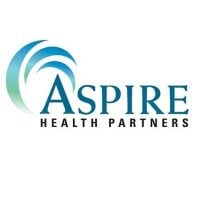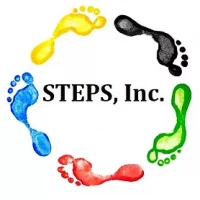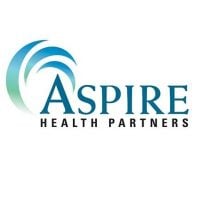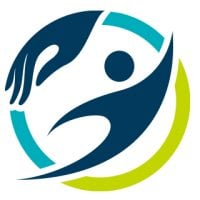About This Florida Facility
Aspire Health Partners - Kennedy Campus, located in Orlando, Florida, offers comprehensive addiction treatment services with a focus on compassionate care. This renowned facility specializes in treating individuals struggling with substance abuse disorders, including alcoholism, opioid addiction, and co-occurring mental health conditions.
- Provides medically assisted detox and inpatient treatment with 24/7 medical supervision
- Offers individual counseling and psycho-educational lectures to support recovery
- Provides a supportive housing program, Dave's House, for continued care
Aspire Health Partners - Kennedy Campus is CARF accredited, demonstrating their commitment to delivering high-quality, evidence-based treatment services. They believe in respecting the dignity of those they serve and aim to provide cost-effective care that empowers individuals and families to lead healthier, more independent lives.
The facility treats a wide range of addictions, including alcoholism, opioid addiction, and co-occurring mental health disorders. Treatment methods encompass detoxification, inpatient rehabilitation, and dual-diagnosis treatment. Aspire Health Partners - Kennedy Campus offers various levels of care, from inpatient to residential, ensuring individuals receive the appropriate level of support for their unique needs.
Genders
Ages
Modality
Additional
Accreditations

CARF
The Commission on Accreditation of Rehabilitation Facilities (CARF) is a non-profit organization that specifically accredits rehab organizations. Founded in 1966, CARF's, mission is to help service providers like rehab facilities maintain high standards of care.
Conditions and Issues Treated
Opioid addiction treatment should be done in a medically supervised drug rehab. Opioid addiction treatment will include detoxification and drug rehab counseling to help both the user and their loved ones learn how to live a successful sober lifestyle. Methadone, buprenorphine, and naltrexone are three medications that can help treat opioid addiction. Individual drug rehab counseling sessions can be helpful to discuss any questions or concerns with the drug treatment program.
When addiction and psychiatric issues co-occur, the addict’s recovery is more successful when both conditions are treated. A dual diagnosis refers to a condition in which the patient is diagnosed with two health issues: addiction and bipolar disorder.
Usually, dual diagnosis sufferers are prescribed a combination of treatments for each condition. The most common therapies are psychotherapy, behavioral therapy, spiritual counseling, 12-step programs, and medication management.
Psychiatric conditions are an obstacle to recovery because they can create roadblocks to a healthy lifestyle. Drugs and alcohol may be used as a means of self-medication, which can have dangerous consequences. Over time, addicts build up a tolerance and suffer withdrawal symptoms when drug use is stopped.
With the proper treatment, dual diagnosis sufferers can overcome their conditions and achieve lasting sobriety.
Levels of Care Offered at Aspire Health Partners - Kennedy Campus
This center offers a variety of custom treatment tailored to individual recovery. Currently available are Aftercare Support, Detox, Drug Rehab, Dual-Diagnosis, Inpatient, Residential, with additional therapies available as listed below.
Detoxification is the first step in drug addiction treatment. A controlled environment where symptoms can be managed with medication and close observation is provided by drug detoxification. Detoxification is an essential step in the recovery process, but it is also one of the most dangerous. Due to the potential danger, it’s critical to understand what detoxification is and how to complete it safely.
A detox program helps the person physically withdraw from drugs and helps them track their progress. So, suppose the person isn’t ready for sobriety (or relapses). In that case, the treatment professionals can catch it early and help re-orient them towards recovery.
Inpatient treatment is an option that provides addicts with a supportive environment in which they can stop using. This type of intensive care and supervision is appropriate for those who were unable to quit on their own or need more structure than they could get from outpatient treatment, such as the addict most in need of this level of care.
The goal of inpatient rehab is for the addict to stay focused on sobriety and remain free of mood altering substances. Inpatient treatment programs usually offer the following: detox, therapy groups, one-on-one counseling, medication management and aftercare planning.
Residential treatment programs are those that offer housing and meals in addition to substance abuse treatment. Rehab facilities that offer residential treatment allow patients to focus solely on recovery, in an environment totally separate from their lives. Some rehab centers specialize in short-term residential treatment (a few days to a week or two), while others solely provide treatment on a long-term basis (several weeks to months). Some offer both, and tailor treatment to the patient’s individual requirements.
Aftercare is a part of drug rehabilitation. It is also known as “post-treatment support.” Aftercare programs are available for addicts after they complete drug rehab. It is often the final step in the recovery process. The goal of aftercare is to ensure that addicts maintain their achievements in rehab and do not relapse. Professionals generally provide aftercare (including addiction therapists, physicians, social workers, psychologists) and involve individual and group therapy sessions.
Therapies & Programs
Individual therapy is a critical component of addiction recovery. It allows the patients to go deep into their core issues and discover how to handle those problems better. Therapy can be conducted in individual sessions as well as group settings. In individual therapy for addiction, the patient meets with their therapist one-on-one to focus on the underlying issues. This allows patients to open up and discuss personal topics they may not feel comfortable discussing in a group setting. This type of therapy can help develop solutions specific to each patient, which helps speed up the recovery process.
Couples therapy is beneficial for couples in which at least one partner has a substance use disorder. This type of therapy can help partners improve communication skills, which is an important factor in a healthy relationship. It can also help partners better understand one another so they have a greater understanding of how the other partner may be feeling.
Benefits of couples therapy include:
- Improvement in communication skills
- Increased understanding of the dynamics within a relationship
- Increased sense of support and trust in the relationship
- Better teamwork between partners/increased willingness to listen and work together
- Enhanced tolerance of each other’s shortcomings
- Improved ability to have open, honest communication with each other
Family therapy is a crucial part of drug treatment and getting sober. It is one of the most effective ways to help addicts stay on the path to long-term sobriety. When a drug addict decides that they want to try and get sober, it takes the support of every person they love to succeed. It can be incredibly difficult for loved ones to watch an addict go through the pain and suffering of withdrawal, but by being there with them and supporting them, they can help to make sure that the addiction never returns.
One of the most important parts of family therapy is the relapse prevention plan. During treatment, therapists and doctors will often sit down with the addict and their family to develop a plan in case the addict ever feels like they want to use again. This plan should involve steps the addict and family can take together to prevent them from relapsing in the future. An addict’s family can play a vital part in helping them to avoid relapse because they can spot the warning signs and help them get back on track before it becomes too much of a problem.
Group therapy helps prevent addicts from feeling isolated or unique in their situation by offering a sense of comfort and fellowship. It also creates a forum for addicts to build their support systems and learn from each other. The group therapy sessions at Aspire Health Partners - Kennedy Campus occur in a group setting rather than one-on-one to create a safer, controlled environment where addicts feel comfortable.
Trauma therapy helps people dealing with addiction by allowing them to confront the traumas of their past and move past them. It is important to note that trauma therapy should not be confused with PTSD (post-traumatic stress disorder) Rather, it is used to treat the effects of trauma, which are often at the root of addiction.
Dialectical Behavior Therapy was developed in the 1980s to treat chronically suicidal individuals. It is a cognitive-behavioral therapy that combines strategies derived from Zen Buddhism, such as mindfulness training. DBT has been adapted for use with other types of psychiatric problems, including substance abuse and personality disorders. DBT aims to help patients change their thinking and behavior, instead of relying on medication.
Cognitive Behavioral Therapy (CBT) is a common therapeutic approach to help drug addicts. It teaches addicts new ways of thinking and behaving so that they can avoid relapse. There are several forms of CBT used in drug rehabilitation centers.
Cognitive Restructuring helps addicts identify faulty, negative thinking so that they can work together with the therapist to find healthier ways of thinking, resulting in better decision-making.
Cognitive Behavioral Therapy for Addiction uses the principles of CBT to help treat addiction. It focuses on specific aspects of each person’s thinking, feeling, physiology, and behavior. It aims to identify specific problems in these areas and create a personalized treatment strategy.
The best drug treatment centers offer various services to help addicts learn how to live without drugs. Since addiction is a chronic physical and mental illness, addicts need to learn as many life skills as possible to help them stay clean and sober.
Many drug treatment centers like Aspire Health Partners - Kennedy Campus offer life skills activities as part of their addiction recovery programs. Examples include cooking classes, employment training, resume writing seminars, parenting classes, and computer training. When addicts have various life skills to lean on, they’re better equipped to put their addiction behind them for good.
The primary goal of life skills activities at drug treatment centers like Aspire Health Partners - Kennedy Campus is to help addicts recover from addiction and learn how to live a useful, productive life. Life skills activities help addicts find employment, take care of their families, and give back to the community. After learning about these various life skills, addicts are better prepared to return to society and lead happy healthy lives.
Payment Options Accepted
For specific insurance or payment methods please contact us.
Is your insurance accepted?
Ask an expert, call (888) 674-0062
Aspire Health Partners Associated Centers
Discover treatment facilities under the same provider.
- Aspire Health Partners - Crossroads of Sanford in Sanford, FL
- Aspire Health Partners - Mens Program in Orlando, FL
- Aspire Health Partners - Cocoa in Cocoa, FL
- Aspire Health Partners - ANCHOR in Orlando, FL
- Aspire Health Partners - Men's Residential in Orlando, FL
Learn More About Aspire Health Partners Centers
Additional Details
Specifics, location, and helpful extra information.
Orlando, Florida 32810 Phone Number(407) 875-3700 Meta DetailsUpdated April 15, 2024
Staff Verified
Patient Reviews
There are no reviews yet. Be the first one to write one.
Orlando, Florida Addiction Information
Florida is one of the nation's epicenters for substance abuse and drug-related overdoses. In 2014, around 410,000 Florida residents were addicted to drugs and alcohol. Over the last 10 years, 12% of all deaths in the state were attributed to substance abuse. Treatment admissions for alcohol reached 24,329 patients in 2016, and 2.5% of Florida high school students admitted to using crack cocaine.
In 2016, there were over 1,400 opioid-related overdoses in Florida, and Orlando accounted for nearly 10% of those overdoses. Cocaine was the most common drug found in overdose victims (45%). Alcohol was involved in 31% of all drug-related deaths. If you or someone you know is struggling with addiction, it is important to get help as soon as possible.
Treatment in Nearby Cities
- Maitland, FL (3.2 mi.)
- Coral Gables, FL (210.7 mi.)
- Tavares, FL (22.8 mi.)
- Ormond Beach, FL (51.0 mi.)
- Oviedo, FL (13.0 mi.)
Centers near Aspire Health Partners - Kennedy Campus
The facility name, logo and brand are the property and registered trademarks of Aspire Health Partners - Kennedy Campus, and are being used for identification and informational purposes only. Use of these names, logos and brands shall not imply endorsement. RehabNow.org is not affiliated with or sponsored by Aspire Health Partners - Kennedy Campus.
